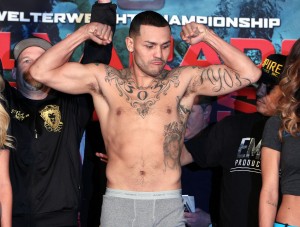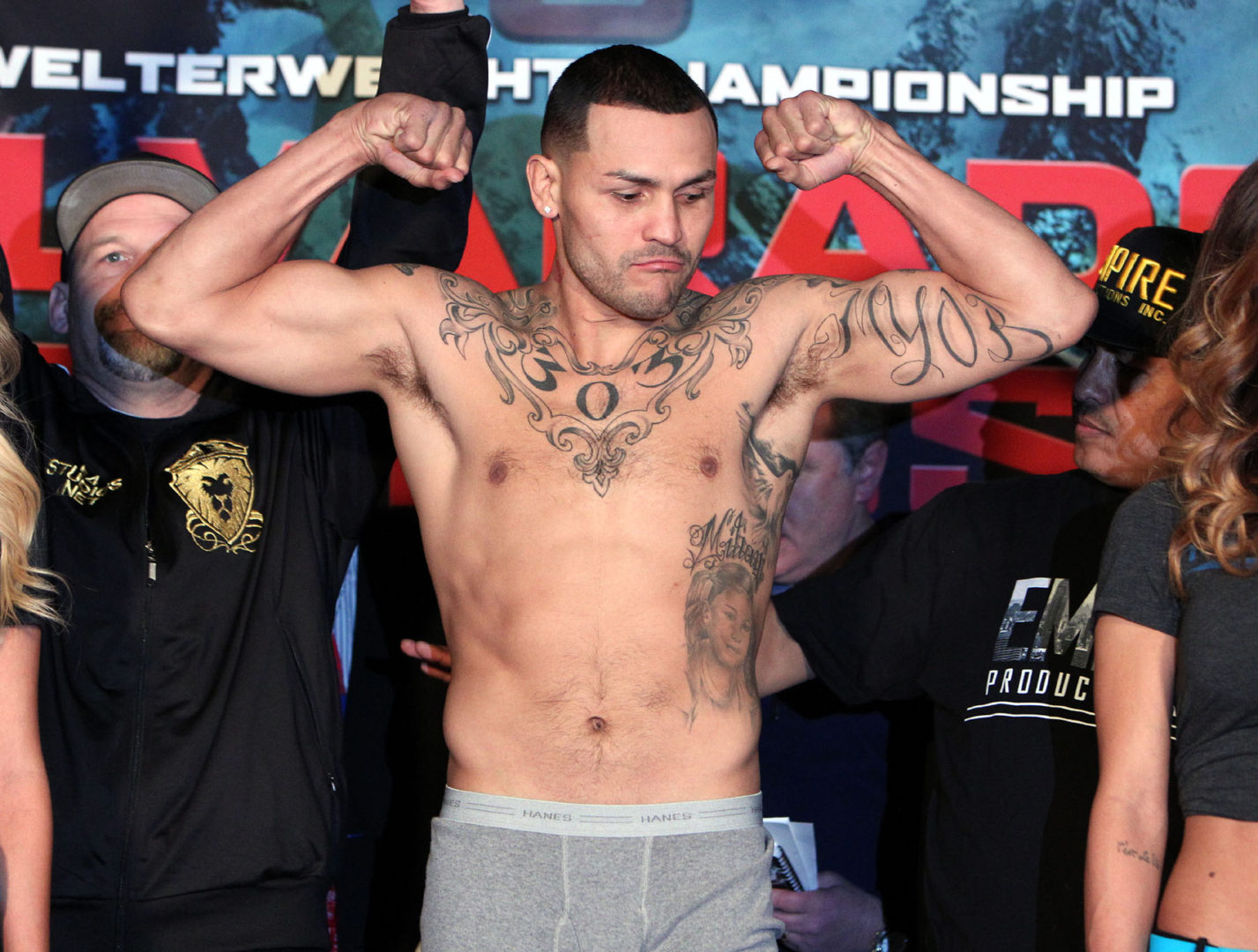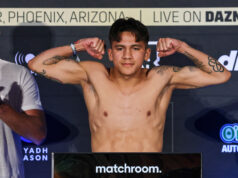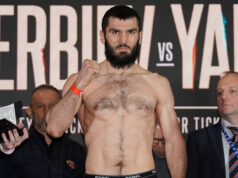By Bart Barry-

HOUSTON – In the good times there was a lameness to this city that didn’t make the brochures; places closed early, nothing opened Sundays, and when folks told you how proud they were of their city it felt strained. That lameness has been replaced by a sort of anger that happens to cities that once boomed then stopped booming then stopped telling others how much they were booming (salesmen necessarily being the most oblivious of rejection) and then resigned themselves to settling in, and whose transplants now look about and realize they didn’t want to live here in the first place.
We were gathered in this city, just the same, for an eight-match Top Rank card that featured the returns of hometowner Juan Diaz and Colorado’s Mike Alvarado, and both men won by knockout, but only one of them, Diaz, should continue fighting.
No one ever told me he moved to Houston and loved it. There was money here, though, and that money calmed the slight uneasiness one feels when he’s uprooted himself for something that isn’t quite-quite. Two years ago crude oil was trading over $100 per barrel. Today it is heaving to return to $40. This city’s humor rises and falls with those prices, and right now its humor is lower than it has been anytime in the last decade – except last month; oil is up $10 since then, and it’s springtime after all, so how about them green shoots?
The boom times are not reflective times, and what a city does with its wealth while it booms sets a floor of sorts for where it goes when it busts (except in prolonged cases like Detroit, the one ever-busting American city of the last halfcentury). This city did some Texas tackiness, big hair and sparkly things, sure, though nothing that approached Dallas’ scale, and its skyline remains alluring, but it neglected wholly its infrastructure. With all the money that sloshed about, one wonders, and did wonder, why are its surface streets barely fit for urban attack vehicles (ah, the Hummer – enduring symbol of a different bust: Phoenix housing market) and otherwise unfit for any sensible car?
Back when Austin, this state’s capital, was actually weird – not “keep Austin weird” weird – it got by with a hippy sensibility like: we’re all in this together, so yield the right of way when you know I can’t see round the tree at the intersection. Houston’s eroding infrastructure is making it weirder every day, though without any sensibility but greed to bind its citizenry; in Houston, now, you drive like a maniac because some primal intuition tells you you’re safer that way, and you are – because when you’re moving faster than the loons on either side, you regain half your attention by no longer needing a rearview mirror.
Arena Theatre was a fine, if well-hidden, venue to watch a fight Saturday, and only a sucker paid for better than the cheapest seat, since there wasn’t a distant view in the entire bowl, and the ring sat up shiny in the venue’s very center. Heard in the Top Rank section: “Small rings make for great matchmakers.” The ring was tiny; no one larger than a middleweight set foot in it during the card’s eight matches, and everyone looked large.
There’s a slapdash South American-mercado feel to much Spanish-language television, the don Francisco style of having the host perform commercials onstage during a show, and it interrupted the pleasure of Saturday’s card, some. Television owns boxing, of course, the programming director tells the commission when it may ring the opening bell, but the delays of a show performed for Spanish-language television are, even by the known standard, a touch gratuitous. Seated a few rows behind the UniMás commentary team with a clear view of their monitors, one sees the main event is being delayed by week-old commercials advertising the co-main event that already went off; it’s a sloppy, sales-blitz mentality wherein the host sees himself as an emcee, not a journalist, and his target demographic meanwhile slumps its shoulders and trudges back to the beerline.
Saturday’s crowd was the usual mix of hometown fight figures and familiars and friends and hangerson, and local businessmen reveling in others’ danger. A lawfirm gathered in the row behind me, and when they weren’t hellbent on outnamedropping one another, they were admonishing the fighters to “punch him in the neck” or “knock his head off” or “finish him”! And so.
Mile High Mike looked exactly the same Saturday as he did the last time you saw him, and that’s a problem, obviously, because the last time you saw him he was stopped by a limited fighter, albeit a former champion, and this time he plied his wares against a lighthitter with 10 knockouts and six losses in 25 matches. Eventually Alvarado bludgeoned him down with wild righthands, but Mile High Mike and his rehabby salespitch, “I’ve been fighting my demons as much as my opponents,” are through with major championship prizefighting.
The Baby Bull looked about the same, too, and that’s a really good thing. Never the bearer of a pinup physique, Juan Diaz still weighs and fights the exact same way at 32 as he did at 22. He does not set on any punch so he does not have concussive power, but he doesn’t need it: Because he’s somehow stayed in the same weightclass, where his chin is proven, and because he possesses more belief in his own conditioning than just about anyone in the game today, and because there’s exactly no chance of another Nate Campbell or Juan Manuel Marquez or even Paulie Malignaggi showing up at lightweight in the next five years, Diaz will make a competitive and fun title match with anyone he fights.
It was good to see Juan Diaz do so well in front of his friends and family.
The best sight of all, though, was Israel Vazquez, the color guy on the UniMás broadcast team, being as unassuming in retirement as ever he was vicious in the ring. The fans queued up for photos with him, and Izzy lost himself in their adoration, requiring several times the program director to scold him for nearly missing cues. Vazquez’s delta – violence in combat to gentleness in society – is the greatest I’ve seen in our sport that has so very few happy endings, and how properly joyful it makes me to think Israel might be one of them.
Bart Barry can be reached via Twitter @bartbarry










